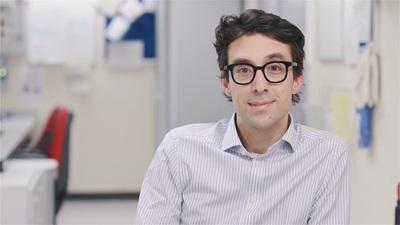
Life-changing work at the University of Dundee is being showcased nationally as an example of cutting-edge medical research.
Groundbreaking Dundee-led treatment using focused ultrasound to tackle essential tremors is featuring at the Royal Society’s Summer Science Exhibition, the UK’s leading public showcase of research innovations.
It is part of the Focused Energy: Extraordinary Ultrasound exhibit hosted by FUSE CDT, a partnership between the Centre for Medical and Industrial Ultrasonics at the University of Glasgow, and the Centre for Ultrasonic Engineering at the University of Strathclyde.
The exhibit, led by Dr Tom Gilbertson, Consultant Neurologist and Clinical Senior Lecturer at Dundee, is one of just 13 selected for the prestigious event. It highlights how Magnetic Resonance-guided Focused Ultrasound (MRgFUS) is transforming care for those living with essential tremor, a common neurological condition that causes involuntary shaking.
The University’s School of Medicine is home to Scotland’s first MRgFUS service and remains a UK leader in research and clinical trials.
Essential tremor is a chronic neurological condition, with faulty circuits in the thalamus, a small area at the base of the brain, predominantly prompting involuntary movements in the hands and arms.
Previously, invasive surgery was required to mitigate severe tremors, but MRgFUS utilises high-intensity focused ultrasound to disrupt the faulty electrical circuits in the brain which cause the tremors. The non-invasive procedure takes a matter of hours and can help restore control of movement to an individual’s hands that they may not have experienced for decades. Hugely effective in the treatment of essential tremor, initial research also suggests it may also have a role in treating the symptoms of Parkinson’s disease.
The project is a collaboration with Dr Isla Barnard, Postdoctoral Research Assistant in Dundee’s School of Science and Engineering. As part of the London showcase, the pair will also present a live talk titled 'Brain surgery without scalpels'.
You can learn more about the event on the Royal Society website.